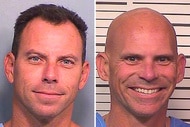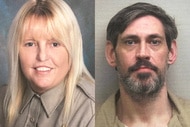Create a free profile to get unlimited access to exclusive videos, breaking news, sweepstakes, and more!
Supreme Court Rules In Favor Of Texas Death Row Inmate Who Wants Hands Laid At Execution
The Supreme Court ruled that the state of Texas must allow the pastor of death row inmate John Henry Ramirez to pray out loud and touch him during his execution.

The Supreme Court said Thursday that states must accommodate the wishes of death row inmates who want to have their pastors pray aloud and even touch them during their executions.
The court ruled in the case of a Texas inmate, John Henry Ramirez, who challenged state rules that would have forced his pastor to remain silent and apart from him as he is put to death.
Chief Justice John Roberts wrote in an 8-1 opinion joined by conservative and liberal justices that "it is possible to accommodate Ramirez's sincere religious beliefs without delaying or impeding his execution." Some other states and the federal government have recently carried out executions where audible prayer and some physical contact were permitted in the execution chamber.
Only Justice Clarence Thomas dissented. Thomas said Ramirez has repeatedly attempted to delay his execution and his current lawsuit "is but the latest iteration in an 18-year pattern of evasion."
Roberts noted that Texas "appears to have long allowed prison chaplains to pray with inmates in the execution chamber, deciding to prohibit such prayer only in the last several years." He also rejected concerns that allowing a pastor to touch an inmate could interfere with the intravenous lines that carry the drugs used to carry out the execution. An inmate could be touched "on a part of the body away from IV lines, such as a prisoner's lower leg," he wrote, noting Ramirez's lawyer had said it would be sufficient if his pastor could touch his foot.
Under a federal law that protects the religious rights of prisoners, Texas needed to show both a compelling need for its policy and show that its restrictions were the least necessary to accomplish officials' security and other goals. The justices said Texas had not done so.
Roberts' opinion also urged states to think about the religious needs of inmates in the context of executions and proactively adopt policies. "If States adopt clear rules in advance, it should be the rare case that requires last-minute resort to the federal courts," he wrote. Five states and the federal government carried out a total of 11 executions last year.
Ramirez is on death row for killing a Corpus Christi convenience store worker during a 2004 robbery. Ramirez stabbed the man, Pablo Castro, 29 times and robbed him of $1.25.
Ramirez's attorney Seth Kretzer said in a telephone interview that he was "ecstatic" about the ruling. He said he expects Texas to rewrite its policy as a result of the decision, but he said it was unclear how long that might take or what restrictions the state might still seek to impose.
In his opinion, Roberts suggested a less restrictive policy could have required "silence during critical points in the execution process" or limited "the volume of any prayer." Similarly, the state might have restricted "the time period during which touching is permitted" or required the pastor to undergo training.
Texas officials did not immediately respond to a request for comment.
Lower courts had sided with Texas in allowing its policy, but the Supreme Court halted Ramirez's scheduled Sept. 8 execution in order to consider his case. Executions in Texas, the nation's busiest death penalty state, had been delayed while the court considered the case.
Texas' policy on spiritual advisers in the death chamber has changed over the last several years in part because of decisions by the justices. As the Supreme Court has grown more conservative in recent years it has been less open generally to last-minute challenges to death sentences. But issues surrounding ministers in the death chamber have been one area where the justices have had some openness to stopping an execution.
In 2019, the justices blocked the execution of Texas inmate Patrick Murphy over the issue of his spiritual adviser. At the time of Murphy's scheduled execution, Texas allowed state-employed religious advisers to be present in the execution chamber but only employed Christian and Muslim advisers, not anyone who was Buddhist, Murphy's faith. That meant Murphy's Buddhist spiritual adviser could only be present in the viewing room and not in the execution room itself, an outcome he said was unacceptable.
Texas responded by barring all clergy from the execution chamber, but inmates filed additional lawsuits. Texas ultimately changed its policy in 2021 to allow both state-employed chaplains and outside spiritual advisers who satisfy certain screening requirements to go into the execution chamber. But it had said they could not speak or touch the inmate.
The Biden administration had weighed in on Ramirez's case, arguing that Texas' policy was overly restrictive. During the previous administration of former President Donald Trump, the federal government had resumed executions for the first time in 17 years, carrying out 13 of them at the federal execution chamber in Terre Haute, Indiana. In at least six of those executions, religious advisers spoke aloud in the execution chamber and in at least one case there was brief physical contact.
The Biden administration has halted federal executions while the Justice Department conducts a review of its policies and procedures.






















